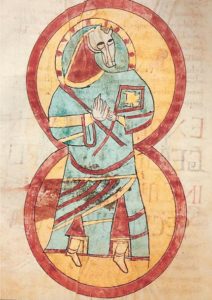CFP : Writing Europe before 1450
We are delighted to open a CFP for the Writing Europe before 1450 : A Colloquium, University of Bergen, 3rd-5th June 2012. After the success of the Writing England Conference in 2010, Writing Europe : A Colloquium aims to draw on a range of approaches and perspectives to exchange ideas about manuscript studies, material culture, multilingualism in texts and books, book history, readers, audience and scribes across the medieval period and beyond
Plenary speakers : William Johnson (Duke University) ; Kathryn A. Lowe (University of Glasgow) ; Marilena Maniaci (Universita` di Cassino)
CALL FOR PAPERS
We welcome proposals from scholars working on writers, book production and use, and responses to texts in any language up to 1450. Abstracts (300 words or less) for papers (20 minutes) should be submitted on-line using the form provided. Please visit the conference web site for additional information. To encourage participation from a range of individuals and institutions, a limited number of bursaries will be available to assist in covering travel expenses for participants with limited institutional support.
Places are limited to allow us to subsidise costs, including registration, accommodation and meals. Please send your abstract by 31 January 2012. For further information please contact one of the organisers at the e-mail below.
Conference web site : http://www2.le.ac.uk/departments/english/news/conferences/writing-europe
Writing Europe before 1450 is a collaboration between the Centre for Medieval Studies at the University of Bergen and the School of English at the University of Leicester, and is generously subsidised by the Centre for Medieval Studies and by the School of English.
Contact
Dr Orietta Da Rold
Lecturer in Chaucer and Medieval Literature
School of English
University of Leicester
University Road
LE1 7RH
Tel. +44 (0)116 252 2778
e-mail: odr1@le.ac.uk

Understanding the Medieval Book
On Monday and Tuesday 26-27 March 2012 the University of South Carolina will sponsor a series of FREE seminars on medieval books. The sessions will take place in the new Hollings Special Collections Library and use the university’s 130 medieval books and fragments (see www.scmanuscripts.org). The 2012 seminars will be conducted by Dr. Scott Gwara, Professor of English at the University of South Carolina. Program applications can be found at this link (deadline 15 December) : http://cdh.sc.edu/mslink/ (… scroll down to the bottom of the page).
Librarians, undergraduates, graduate students, and faculty will come away with meaningful introductions to missals, Books of Hours, breviaries, and bibles, with special attention given to relevant online resources. \”Understanding the Medieval Book\” is a hands-on program with medieval manuscript codices acquired recently, including an English pocket bible, ca. 1240, and an Augsburg missal, ca. 1350. Teams will be assigned manuscripts for joint study and presentation. Last year’s inaugural session featured Christopher de Hamel and a blog of these seminars can be found here (thank you, Rick Ring at Trinity College, CT) : http://commons.trincoll.edu/watkinson/2011/04/
Scott Gwara, Professor of English
University of South Carolina
http://www.cas.sc.edu/engl/people/pages/gwara.html
An experimental phase in the history of early printing : Fifteenth-century blockbooks
Bayerische Staatsbibliothek München, Friedrich-von-Gärtner-Saal, 16-17 February 2012
In the context of a project funded by the Deutsche Forschungsgemeinschaft (http://www.dfg.de/index.jsp) the Bayerische Staatsbibliothek in cooperation with the Centre for the Study of the Book of the Bodleian Library, University of Oxford, (http://www.bodley.ox.ac.uk/csb/) organizes the international conference \”An experimental phase in the history of early printing: Fifteenth-century blockbooks\”. During the conference, the exhibition \”From the ABC to the Apocalypse. Life, Faith and Death in Late Mediaeval Blockbooks\” will be opened which will be on show until 6 May 2012 in the treasure room of the Bayerische Staatsbibliothek.
Blockbooks (xylographs) are books with a comparatively small number of pages which were produced in the fifteenth century from woodcuts and represent a form of transition between hand illuminated manuscripts and illustrated printed books. They count among the rarest and most precious items collected by libraries. Up to today, they raise numerous questions for bibliographical, art historical and philological research. Until recently, the problematic state of conservation of many blockbooks has severely hindered their scholarly examination. While cataloguing projects abroad, most recently in the Bodleian Library at Oxford, have produced important new insights regarding blockbooks, a systematic analysis of the xylographic holdings of German libraries is still outstanding.
Since 2009, all c. 90 copies of blockbooks owned by Bavarian institutions have been digitized after restoration of the damaged copies in the course of a project funded by the Deutsche Forschungsgemeinschaft. The watermarks in the paper were documented with a newly developed technology (thermography or infra-red photography). The project thus constitutes an organic continuation of the projects funded by the DFG for digitizing the incunabula and 16th-century books printed in German territories held at the Bayerische Staatsbibliothek. The digital reproductions of all blockbooks are accessible on the website of the Bayerische Landesbibliothek Online :
http://www.bayerische-landesbibliothek-online.de/blockbooks
Alongside digitization, scholarly descriptions of the blockbooks are created which aim at a high bibliographic standard equivalent to the more recent international catalogues which reflects the importance of the items. After the end of the project, the descriptions will be made accessible in electronic form via the internet as well as in a printed catalogue.
The conference will provide an opportunity to discuss the results achieved by the project so far with representatives of various academic disciplines. The first day will focus on questions with regard to the materiality of the blockbooks, while the second will be devoted to questions of content, function and reception relating to a selection of examples.
Prospective participants are asked to register by 31 January 2012 online:
http://www.bsb-muenchen.de/Veranstaltungen-fuer-Fachpublikum.339.0.html
Participation in the conference is free.
Conference programme:
http://www.bayerische-landesbibliothek-online.de/xylographa-tagung
http://www.bayerische-landesbibliothek-online.de/images/blo/startseiten/Blockbuecher/Blockbuchtagung_Programm.pdf
Donnerstag, 16.2.2012
14:00-14:15
Begrüßung
14:15-15:00
Paul Needham (Princeton)
The paper stocks of blockbooks : Allan Stevenson and beyond
15:00-15:45
Richard Field (Yale)
Cutting remarks : A brief examination of the technique of the early woodcut
15:45-16:30
Ad Stijnman (Wolfenbüttel)
The colours of black : printing inks for blockbooks
16:30-17:00 Kaffeepause
17:00-17:45
Andrew Honey (Oxford)
The binding of blockbooks : searching for evidence of contemporary
binding methods
17:45-18:30
Rahel Bacher (München):
Erkenntnismöglichkeiten durch Digitalisierung und Thermographie: Produktionszyklen innerhalb einer Blockbuchausgabe
19:00
Eröffnung der Blockbuch-Ausstellung der BSB (mit Empfang)
Freitag, 17.2.2012
9:00-9:45
Nigel Palmer (Oxford)
Das erste Blockbuch? Eine literaturwissenschaftliche Perspektive auf das Exercitium super Pater noster
9:45-10:30
Joost Robbe (Aarhus)
Zur Genese der niederländischen Typoxylografien des Speculum humanae salvationis
10:30-11:00 Kaffeepause
11:00-11:45
Peter Schmidt (München)
Das Canticum Canticorum im Rahmen der Text-Bild-Geschichte, Exegese und
Frömmigkeit
11:45-12:30
Sabine Griese (Leipzig)
Das Zeitglöcklein. Strategien der Gebetsandacht
12:30-14:00 Mittagspause
14:00-14:45
Almut Breitenbach (Münster)
Text in Bewegung. Die Septimania poenalis in Blockdruck und handschriftlicher Überlieferung
14:45-15:30
Susanne Rischpler (Wien/Würzburg)
Bild und Text in der Ars memorandi
15:30-16:00 Kaffeepause
16:00-16:45
Richard Kremer (Dartmouth College, Hanover)
A Census of All Known Copies of Regiomontanus’s Blockbook Calendar : New Technologies, New Questions, New Findings?
16:45-17:30
Frank Fürbeth (Frankfurt)
Das Verhältnis der Überlieferung von Handschrift und Blockbuch bei der Johannes Hartlieb zugeschriebenen Chiromantie
17:30-18:15
Oliver Duntze (Berlin)
Zum komplexen Verhältnis von xylographischer und typographischer Schrift : Die Blockbuchausgaben der Ars minor des Aelius Donatus
18:15-18:30 Schlussdiskussion
_______________________________________
Dr. Bettina Wagner
Abteilung fuer Handschriften und Alte Drucke
Bayerische Staatsbibliothek
Ludwigstr. 16
D-80539 Muenchen
Germany
email : bettina.wagner@bsb-muenchen.de
Tel. +89 / 28638-2982
Fax. +89 / 28638-12982 oder 2266
postbox : D-80328 Muenchen
http://www.hgw.geschichte.uni-muenchen.de/personen/lehrbeauftragte/wagner/index.html
Séminaire IRHT : Production de l’écrit : travail et compétences des scripteurs
Institut de Recherche et d’Histoire des Textes – Section de Diplomatique, antenne de Paris
Groupe de travail sur PARIS AU MOYEN ÂGE. Programme 2011-2012
Production de l’écrit : travail et compétences des scripteurs
Organisation : Caroline BOURLET (IRHT) et Boris BOVE (Paris VIII et IRHT)
Coordination du thème sur les acteurs de l’écriture : Julie CLAUSTRE (Paris 1 UMR 8589 LAMOP)
7 séances,le vendredi de 14h30 à 17h30 à partir du 18 novembre 2010, à l’IRHT, 40 avenue d’Iéna, 75116, Paris.
Salle Jeanne Vieillard, à 14h30 (métro Iéna)
Pour la deuxième année consécutive, le groupe de travail sur Paris au Moyen Âge sera consacré aux acteurs de l’écriture à Paris. Les interventions de l’année dernière se sont attachées à une histoire sociale de ceux qui ont écrit à Paris au Moyen Âge, à leurs profils, à leurs parcours, à leurs places institutionnelles, afin de tenter de discerner des éléments d’une communauté de destin. Plusieurs interventions, dont les auteurs ont accepté de les publier, paraîtront prochainement dans la revue Mémoires Paris et Île de France à l’invitation de Michel Balard (qu’il soit ici remercié !). Cette année, nous poursuivons notre enquête et nous nous attacherons plus spécifiquement à La production de l’écrit : travail et compétences des scripteurs. Si les aspects sociaux restent présents, il s’agira de s’interroger plus spécifiquement sur les méthodes de travail, sur l’impact des évolutions techniques (imprimerie) ou culturelles (circulation de modèles), de croiser l’approche des pratiques et des techniques, caractéristique de ce champ d’étude, et l’approche sociale des hommes et des femmes qui écrivaient ou qui avaient recours à l’écrit.
Programme des séances
Vendredi 18 novembre
Vincent DEBIAIS (CESCM), Les inscriptions médiévales parisiennes : procédés génétiques et horizon(s) de réception
Luigi SANCHI (IRHT), Les imprimeurs humanistes et la censure.
Vendredi 16 décembre
Claire PRIOL (LAMOP), La production parisienne d’incunables à la lumière de la production européenne : affinités et spécificités
Florence BERLAND (univ. Lille 3), Les professionnels de l’écrit parisiens au service des ducs de Bourgogne (vers 1360-vers1420)
Vendredi 20 janvier
Dominique POIREL (IRHT) et Rolf GROSSE (IHA), Les écrits à Saint-Victor au XIIe siècle.
Caroline BOURLET (IRHT) et E LALOU (Univ. Rouen): Un clerc du roi et son livre de raison : Guillaume
d’Ercuis.
Vendredi 17 février
Benoît GRÉVIN (LAMOP) et Sébastien BARRET (IRHT), La rédaction des préambules des actes des rois de France au XIVe siècle : une culture de l’écrit pragmatique ?
Boris BOVE (univ. Paris 8 et IRHT), Questions autour du Livre vert de Saint Denis (1411).
Vendredi 23 mars
Claire ANGOTTI (univ. Reims), Lectio et annotations dans les manuscrits du collège de la Sorbonne, XIIIe-XVe siècle.
Anne D. HEDEMAN (univ. Illinois), La traduction visuelle et les premiers humanistes français.
Vendredi 4 mai – Profils de notaires
Isabelle BRETTHAUER (univ. Paris 7), Le cas bas normand.
Julie CLAUSTRE (LAMOP), Le cas parisien.
Vendredi 1er juin
Kouky FIANU (univ. Ottawa) et Darwin SMITH (LAMOP), Le carnet de prêt d’écritures du chapitre cathédral,
XIVe-XVe siècle.
Discussion finale
Pages
Auteur du blog : Jean-Luc DEUFFIC

Commentaires recents
- dans Le livre d’heures et de raison de Maximilien Turpin, conseiller à la Gouvernance de Lille ( † 1704)
- dans Un ami nous a quitté: Gwenaël Le Duc (12 octobre 1951- 24 décembre 2006)
- dans René de Chasteaubriant (+ ca 1500), chevalier pèlerin pour la Terre Sainte, comte de Guazava au royaume de Fez
- dans René de Chasteaubriant (+ ca 1500), chevalier pèlerin pour la Terre Sainte, comte de Guazava au royaume de Fez
- dans Le «Maître du Policratique de Charles V» : un enlumineur breton ?
Visites depuis 10/03/2020
- 24
- 15
- 706



